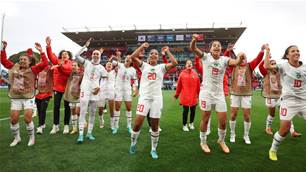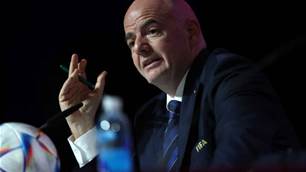FRANK Lowy today reaffirmed the FFA's focus on the 2018 FIFA World Cup but hasn't ruled out a push for 2022 in the event of failure.
Speaking ahead of the World Cup qualifier with Iraq at Suncorp Stadium in Brisbane, he said: "I want to make it clear that we are aiming to host the 2018 FIFA World Cup.
“While I understand that there is a view emanating from Europe that it may well be the turn of Europe to be the hosts in 2018, the fact is football is a world game.
“Europe has unquestionably been the focus of football growth and development for much of the past 80 years, but the future of football is in the ‘new world’ – that is, the developing and growing regions of the world such as Asia.”
Mr Lowy said that Australia is part of the Asian Football Confederation which is the fastest growing region in world football, as well as having the fastest growing economy.
He also said that FIFA has indicated that the bids for the 2018 and 2022 World Cups could be bundled together.
Lowy said: "But I repeat that our focus is on 2018 because it is a powerful way to develop football in the Asian region and we have the capacity to host a major sporting event in this timeframe.”
He said that if Australia is not successful in 2018 it does not rule out 2022.
Mr Lowy also said that staging a major international event such as a World Cup has enormous economic and social benefits for the nation.
He said that a 2004 study by URS Finance and Economics on the economic impact of the 2003 Rugby World Cup found that the total 'value added' to the Australian economy was $289 million. By comparison, the same study noted that the total value added for the Sydney Olympic Games was $6.5 billion, and for the FIFA World Cup held in Japan and Korea in 2002 was $27.7 billion.
“There is a cost to mounting a bid but, if successful, it is an investment which will pay dividends for the nation and future generations,” Mr Lowy said.
“We are also confident that we have strong support from other countries around the world to bid for 2018, and we will be proceeding on this basis.”
“While I understand that there is a view emanating from Europe that it may well be the turn of Europe to be the hosts in 2018, the fact is football is a world game.
“Europe has unquestionably been the focus of football growth and development for much of the past 80 years, but the future of football is in the ‘new world’ – that is, the developing and growing regions of the world such as Asia.”
Mr Lowy said that Australia is part of the Asian Football Confederation which is the fastest growing region in world football, as well as having the fastest growing economy.
He also said that FIFA has indicated that the bids for the 2018 and 2022 World Cups could be bundled together.
Lowy said: "But I repeat that our focus is on 2018 because it is a powerful way to develop football in the Asian region and we have the capacity to host a major sporting event in this timeframe.”
He said that if Australia is not successful in 2018 it does not rule out 2022.
Mr Lowy also said that staging a major international event such as a World Cup has enormous economic and social benefits for the nation.
He said that a 2004 study by URS Finance and Economics on the economic impact of the 2003 Rugby World Cup found that the total 'value added' to the Australian economy was $289 million. By comparison, the same study noted that the total value added for the Sydney Olympic Games was $6.5 billion, and for the FIFA World Cup held in Japan and Korea in 2002 was $27.7 billion.
“There is a cost to mounting a bid but, if successful, it is an investment which will pay dividends for the nation and future generations,” Mr Lowy said.
“We are also confident that we have strong support from other countries around the world to bid for 2018, and we will be proceeding on this basis.”
Related Articles

Morocco blazing a trail for Arab women's football participation

FIFA blasted for OneLove armband threat













